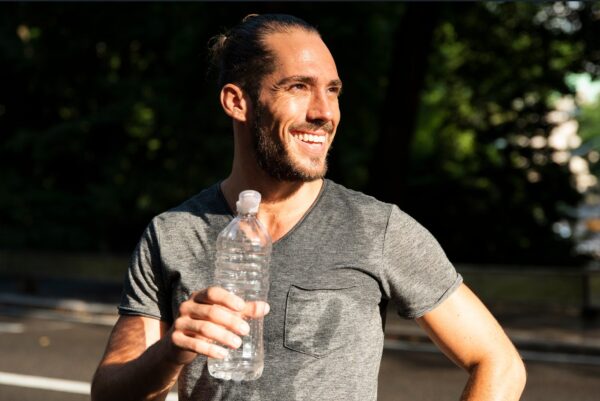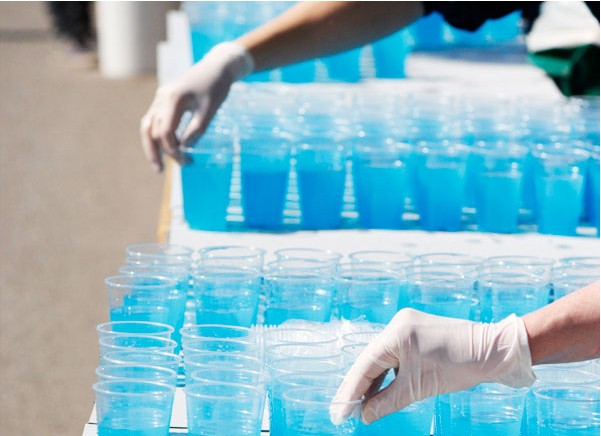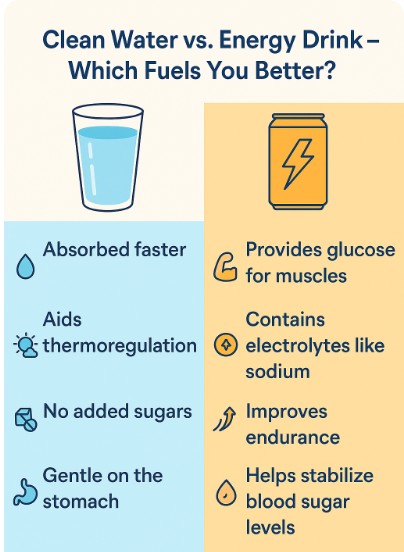
Hydration isn’t an accessory in marathon training—it’s a performance multiplier.
🥵 What Happens When You Lose Fluid During a Marathon?
A fluid loss of just 2% of your body weight can already impact your physical performance. At 3–5% loss, you’re looking at a drop of up to 50% in performance. That’s not just science—it’s something I’ve felt in my bones.
I’ll never forget the 30 km mark in my first hot-weather marathon. I had already lost kilos—my shirt clung to me like glue, my mouth was dry, and my thoughts were blurry. The last 10 km turned into a walk-jog struggle.
That’s when it hit me: thirst is not a reliable guide. If you’re thirsty, you’re already dehydrated.
I passed a runner lying at the side of the road, attended by medics. That sight left a lasting impression. I realized then that dehydration isn’t just about slowing down—it’s a real health risk. Cramps, dizziness, nausea, and heat exhaustion can all hit without warning.
In some extreme cases, heatstroke can be fatal. These aren’t scare tactics—they’re facts. Your body depends on water for basic cellular function. Take that away, and everything starts to unravel.

Even mild dehydration can silently wreck your marathon long before you feel thirsty — your body shows it long before your mind does.
⚖️ How to Check Your Fluid Loss
Wondering how much fluid you actually lose on a long run? The easiest method is to weigh yourself before and after a long run. One kilogram of body weight lost equals roughly one liter of fluid lost.
Try this on your next long slow distance (LSD) run:
-
Weigh yourself right before and immediately after the run.
-
Subtract the after-weight from the before-weight.
-
That’s how many liters of fluid you need to replenish.
This simple check helped me create a fluid strategy for both training and race day. Remember, prevention is your best race-day weapon.
When I did this test on a cool spring morning, I was shocked to see I lost nearly 1.5 kg on a 90-minute run. I didn’t even feel that sweaty! But that’s the hidden danger—dehydration doesn’t always feel obvious. Even in mild weather, your body is working overtime to stay cool. Knowing your personal sweat rate allows you to customize your hydration, not guess it.
Knowing your personal sweat rate removes the guesswork — hydration becomes a strategy, not a gamble.
🌡️ Your Body’s Heat Regulation and Fluid Balance
When you run, your body turns into a furnace. The muscles demand more oxygen, your blood pumps faster, and the heat builds up.
Sweating is your body’s natural air conditioner—but that comes at a cost. Each drop of sweat is water and electrolytes leaving your body. If you don’t replenish it, your blood thickens, your heart works harder, and your performance takes a nosedive.
Once your heart rate creeps toward its max, every step feels harder. This was exactly my experience at kilometer 38—legs cramping, pace dropping, and me thinking: “Why didn’t I just drink earlier?”
Here’s what’s happening under the hood: Dehydration reduces plasma volume, which impairs circulation and the ability to transfer heat away from working muscles. The less blood flow to your skin, the hotter your body becomes.
Add in the electrolyte imbalance—especially sodium—and your risk of muscle cramping skyrockets. That’s the cocktail I drank during my first marathon, and I paid the price.
When plasma volume drops, every system in your body works harder — dehydration is a performance limiter disguised as fatigue.
🥤 Fluid Intake Strategy for Long-Distance Running

You’ve probably seen fluid stations every 5 km in races. They’re not there just for show. They’re there because fluid intake is that important.
On training runs, a fluid belt can be a lifesaver. You won’t replace 100% of your fluid loss while running, but staying within a safe range will keep your performance stable.
Here’s a general hydration guide:
-
In warm environments: max 1 liter/hour
-
In cooler conditions: up to 1.2 liters/hour
Even that has limits. Your stomach can only absorb so much, so sip small amounts regularly rather than gulping at long intervals.
I started experimenting with different drinking intervals—every 15 minutes, every 20 minutes, different bottle nozzles, and even different fluids. Over time, I discovered my stomach handled small sips of diluted electrolyte solution better than plain water. Personal trial-and-error is key.
Small, steady sips beat big gulps every time — consistency keeps your performance stable all the way to the finish.
💧 Water vs. Energy Drink: Striking the Right Balance
You might be wondering, “Should I drink water or energy drink?”
Both! Clean water absorbs faster, but energy drinks supply carbohydrates and electrolytes. The trick is finding your positive fluid balance—hydrating enough to avoid dehydration without overloading your stomach.
However, don’t exceed a 6–7% carbohydrate concentration in your drink. Anything higher slows down absorption. On hot race days, stick to more water early, then introduce energy drinks midway.
I learned this after mixing a homemade drink that was way too sugary—my stomach turned into a washing machine, and I had to slow down for 3 km. Since then, I stick with tested brands during training and mimic those choices on race day.

Hydration isn’t just drinking more — it’s choosing the right mix of water, electrolytes, and carbs for the conditions you face.
🌍 Running in Different Climates: Adjusting Your Hydration Plan
Your environment changes everything. In hot conditions, prioritize water. In cooler climates (under 20°C), a sugar solution can efficiently handle both hydration and energy needs.
A mistake many runners make? Not practicing drinking during training. You don’t want race day to be the first time you try sipping from a cup while panting.
I learned this the hard way when I choked on a cup at 25 km, coughed for 200 meters, and lost my rhythm. Practice drinking during your long runs—it’s a skill like pacing or fueling.
Races in humid conditions are even trickier—sweat doesn’t evaporate efficiently, so your core temperature rises faster. That means you need to hydrate sooner and more frequently, even if you don’t feel overly thirsty. Respect your climate, or it will humble you.
Your climate sets the rules — adapt your hydration plan, or the environment will decide the outcome for you.
🧠 Fluid Balance is a Choice—And a Responsibility
At the end of the day, staying hydrated is something you can control. If it comes down to chasing a PR or protecting your health, choose your well-being every single time.
You might have to slow down slightly to hydrate, but it’s better than collapsing from heat stroke or cramping up so badly you can’t finish.
That day I finished my first marathon, four kilos lighter and a little wiser. It wasn’t pretty, but it taught me the most important lesson: Respect your fluid balance.
Today, I go into races with a plan—how often I’ll drink, what I’ll drink, and when I’ll check in with my body. It’s not paranoia; it’s preparation. And preparation is what separates the finishers from the fallouts.
Hydration is one of the few marathon variables fully in your control — respect it, and your body will reward you.
🙋♂️ People Also Ask
Q: How much should I drink during a marathon?
A: Aim for 400–800 ml per hour depending on heat, pace, and sweat rate. Listen to your body—but start early.
Q: Is water or sports drink better for marathons?
A: Both. Water is absorbed faster; energy drinks provide carbs and electrolytes. Balance them wisely.
Q: How can I tell if I’m dehydrated during a race?
A: Dry mouth, dizziness, chills, and cramping are signs. If in doubt—drink.
The basics never change: start hydrating early, balance water with electrolytes, and listen to warning signs before they escalate.
🧠 Final Thoughts
Hydration might not be the flashiest part of your marathon training—but it’s one of the most critical. Your body is a finely tuned machine, and water is the oil that keeps it running smoothly.
Don’t wait until you hit the wall to realize what your body needed 10 km ago. With a smart hydration plan, you’ll run more comfortably, recover faster, and maybe even hit that dream time.
The beauty of a marathon isn’t just in crossing the finish line—it’s in understanding the journey. Every drop of sweat tells a story, and every sip of water helps you keep writing it.
The secret to a strong finish often isn’t more speed — it’s simply better hydration.
Thanks for reading. If you found this helpful, feel free to share it with a fellow runner—or anyone who needs a reminder that the finish line is never as far as it seems.
This updated version includes fresh strategies, clearer explanations, and practical tips to help you train smarter and stay motivated.






I had no idea A fluid loss of 2% of the total body weight has a negative effect on the physical performance while a fluid loss of 4.5 kg will then reduce the performance to zero. It is very important to stay hydrated as fluid increases performance of the body.
Thanks for sharing this educating piece with me
Hi Layfa2
Thank you for the comment.
– Sorry the late reply
Be Well
helllooo dear, i a really gratefull with such an amazing post you have shared with us so far, your site really is full of such an amazing post, i must say i have been saving each of your pages to learn alt from these article, it really has been an interesting content, cant wait to show my fiends, ill surely share your contents on my social media page.
Hi Skuchmane
Thank you for the comment and the compliment.
– Sorry the late reply
Be Well
During exercise, the main way the body maintains optimal body temperature is by sweating. … Drinking fluid during exercise is necessary to replace fluids lost in sweat. This action will reduce the risk of heat stress, maintain normal muscle function, and prevent performance decreases due to dehydration. Fluid intake is necessary for optimal performance when running.
Hi Philebur
Thank you for the comment.
True. But sometimes we forget it an it has a price in a race.
Be Well